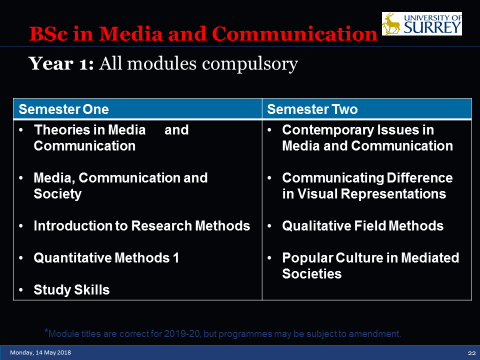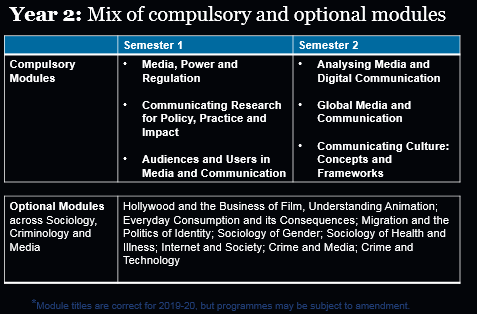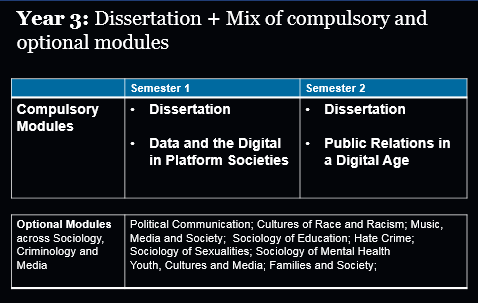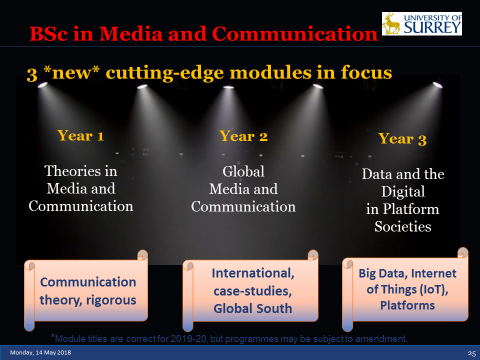The Department of Sociology at the University of Surrey are thrilled to announce their revamped and refurbished degree – the BSc in Media and Communication – taking students from Autumn 2019. Our BSc in Media and Communication offers an intensive and challenging account of 21st century communication studies. You will study state-of-the art, research-led content – from theories of media power, regulation and audiences, to Big Data, digital platforms and international communication. The course draws from the latest media and communication research to produce its suite of compulsory modules and specialist optional modules. Studying Media and Communication at Surrey means you will be at one of the UK’s leading universities for sociology, with our programmes ranked in the top 10 in The Times and The Sunday Times Good University Guide 2018.
What you will study
Our BSc in Media and Communication offers a comprehensive social science degree in the study of contemporary media and communications in global, digital societies. You will cover theories of media power, politics, media and digital regulation, popular culture, policy-relevant research, global communication, digital societies, public relations and media audiences. The BSc in Media and Communication is both broad-based in its incorporation of a wide-range of media forms and cultures, and cutting-edge in its inclusion of sociological critiques of some of the latest technological changes, including platform societies and Big Data. You will develop a rigorous grounding in social science which you can apply to a wide range of careers in media, research, public relations, marketing, business and beyond.
Teaching
Our teaching is research-led. Departmental academics doing excellent research in media and communication teach on our courses, drawing upon their projects. We are proud of our research producing key texts in media and communication, work on online research methods, young people and digital media, the future of audiences in the face of emerging technologies, the role of social media in mental wellbeing, audiences and controversial media content, and youth sub-cultures, amongst many others. You will have modules on core theories and concepts, module on international and global communications, modules on the very latest of digital technologies and their power – including Big Data and the Internet of Things. You will be able to choose from modules covering youth, cultures, music, film, health, the internet, visual communication, regulation. As a theoretical, social science degree, a range of compulsory and optional modules benefit the grounding of this distinctive Media and Communication programme in a Department of Sociology, thereby providing you with a genuinely interdisciplinary experience.
The BSc in Media and Communication has added three research-led compulsory modules to its teaching repertoire from autumn 2019.
- The first year is gaining a compulsory Theories in Media and Communication module. It covers central theoretical and conceptual debates in the field of media and communications as a social science. It pays attention to changing communication environments and the transforming role of media and mediation in contemporary media and data-saturated societies.
- The second year is benefitting from the addition of a new Global Media and Communication module which is truly international in scope. It draws upon international research in media and communication studies, bringing together cases from across the world to paint a picture of what a truly global media and communication studies might look like.
- The third year is benefitting from the addition of a state-of-the-art compulsory module – Data and the Digital in Platform Societies. It offers a critical engagement with the structures and significance of digital platforms, big data and some of the newest emerging forms of communication in digital societies. Topics covered include critical perspectives on Big Data, algorithms, platform societies, self-tracking, quantification, the Internet of Things, data literacies and platform responsibility in datafied societies.
If you are a prospective student, or a parent, teacher or recruitment team, and have any questions about the degree, or want to arrange to speak to our Programme Director Dr Ranjana Das, do contact her on r.das@surrey.ac.uk, or on Twitter @rdcommtweets. If you have inquiries about Admissions to our programmes in the Department of Sociology, feel free to contact our Admissions Officer Dr Tom Roberts at t.m.roberts@surrey.ac.uk.




